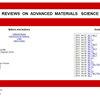海洋假单胞菌菌株 AHG22 外多糖的生物医学和治疗潜力:一种新型生物活性微生物代谢物
IF 3.6
4区 材料科学
Q2 MATERIALS SCIENCE, MULTIDISCIPLINARY
引用次数: 0
摘要
作为化学抗氧化剂和药物的替代品,微生物外多糖(EPSs)正受到越来越多的关注。本研究从红海中分离出一种海洋细菌,它是一种多产的 EPS 生产者,该细菌具有广阔的生物医学和抗菌潜力。假单胞菌菌株 AHG22 产生的 EPS 重达 6.98 g-L-1,编码为 EPSF8,并进行了傅立叶变换红外光谱和高效液相色谱化学分析。随后,通过 2,2-二苯基-1-苦基肼(DPPH)、H2O2、ABTS˙ +、一氧化氮、总抗氧化能力(TAC)和铁还原抗氧化能力(FRAP)对 EPSF8 进行了抗氧化评估研究。在 DPPH 抗氧化试验中,EPSF8 的 IC50 值为 46.99 μg-mL-1 ;在 TAC 试验中,其抗氧化能力为 219.45 μg-mg-1 抗坏血酸当量(AAE);在 FRAP 试验中,其抗氧化能力为 54.15 μg-mg-1 AAE。测试了 EPSF8 对 5-脂氧合酶(5-LOX)和环氧化酶-2(COX-2)酶的体外抗炎作用,并与用作对照的药物布洛芬和塞来昔布进行了比较。结果发现,5-LOX、COX-2、布洛芬和塞来昔布的 IC50 值分别为 14.82、15.49、1.5 和 0.28 μg-mL-1。此外,EPSF8 对α-淀粉酶和α-葡萄糖苷酶具有抗糖尿病活性,其 IC50 值分别为 93.1 和 127.28 μg-mL-1,而阿卡波糖的 IC50 值分别为 50.93 和 4.13 μg-mL-1。与对照组奥利司他(IC50 = 20.08 μg-mL-1)相比,EPSF8 通过抑制脂肪酶的抗肥胖活性的 IC50 = 56.12 μg-mL-1。EPSF8 对革兰氏阳性(G +ve)和革兰氏阴性(G -ve)ATCC 致病细菌菌株具有抗生物膜和杀菌活性。它的最低杀菌浓度/最低抑菌浓度比值≤2,表明它具有广泛的杀菌谱。此外,EPSF8 还被证明具有抗丁酰胆碱酯酶活性,有望用于控制阿尔茨海默氏症。本分析的结果表明,分离出的假单胞菌菌株 AHG22 EPS 有可能被开发成一种有前景的绿色治疗化合物。本文章由计算机程序翻译,如有差异,请以英文原文为准。
Biomedical and therapeutic potential of marine-derived Pseudomonas sp. strain AHG22 exopolysaccharide: A novel bioactive microbial metabolite
Microbial exopolysaccharides (EPSs) are gaining interest as alternatives to chemical antioxidants and pharmaceuticals. This study mines the promising biomedical and antimicrobial potential of a marine bacterium, a prolific EPS producer, isolated from the Red Sea. Pseudomonas sp. strain AHG22 generated an EPS weighing 6.98 g·L−1 , coded EPSF8, subjected to FT-IR and HPLC chemical analysis. EPSF8 was then investigated for antioxidant assessment by 2,2-diphenyl-1-picrylhydrazyl (DPPH), H2 O2 , ABTS˙ + , nitric oxide, total antioxidant capacity (TAC), and ferric reducing antioxidant power (FRAP). EPSF8 had an IC50 of 46.99 μg·mL−1 in the DPPH antioxidant assay and antioxidant capacities of 219.45 μg·mg−1 ascorbic acid equivalent (AAE) in the TAC assay and 54.15 μg·mg−1 AAE in the FRAP assay. The in vitro anti-inflammatory effect of EPSF8 was tested against 5-lipoxygenase (5-LOX) and cyclooxygenase-2 (COX-2) enzymes and compared with the drugs ibuprofen and celecoxib used as controls. The IC50 values of 5-LOX, COX-2, ibuprofen, and celecoxib were found to be 14.82, 15.49, 1.5, and 0.28 μg·mL−1 , respectively. Additionally, EPSF8 revealed antidiabetic activity toward α-amylase and α-glucosidase, and the IC50 values were 93.1 and 127.28 μg·mL−1 , compared to those of acarbose (50.93 and 4.13 μg·mL−1 , respectively). Anti-obesity activity of EPSF8 by lipase inhibition revealed IC50 = 56.12 μg·mL−1 compared to orlistat (IC50 = 20.08 μg·mL−1 ) as a control. EPSF8 displayed antibiofilm and bactericidal activity against Gram-positive (G +ve) and Gram-negative (G −ve) ATCC pathogenic bacterial strains. It had a minimum bactericidal concentration/minimum inhibitory concentration ratio ≤2, indicating a broad bactericidal spectrum. Furthermore, EPSF8 is evidenced to have a promising anti-butyrylcholinesterase activity for the control of Alzheimer’s disease. The findings of the present analysis suggest that the isolated Pseudomonas sp. strain AHG22 EPS can potentially be explored as a promising green therapeutic compound.
求助全文
通过发布文献求助,成功后即可免费获取论文全文。
去求助
来源期刊

Reviews on Advanced Materials Science
工程技术-材料科学:综合
CiteScore
5.10
自引率
11.10%
发文量
43
审稿时长
3.5 months
期刊介绍:
Reviews on Advanced Materials Science is a fully peer-reviewed, open access, electronic journal that publishes significant, original and relevant works in the area of theoretical and experimental studies of advanced materials. The journal provides the readers with free, instant, and permanent access to all content worldwide; and the authors with extensive promotion of published articles, long-time preservation, language-correction services, no space constraints and immediate publication.
Reviews on Advanced Materials Science is listed inter alia by Clarivate Analytics (formerly Thomson Reuters) - Current Contents/Physical, Chemical, and Earth Sciences (CC/PC&ES), JCR and SCIE. Our standard policy requires each paper to be reviewed by at least two Referees and the peer-review process is single-blind.
 求助内容:
求助内容: 应助结果提醒方式:
应助结果提醒方式:


